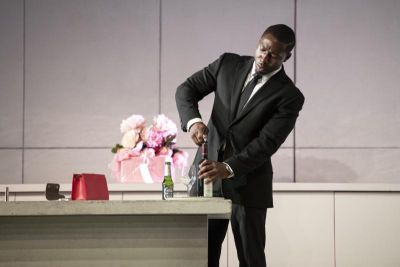Julie
Polly Stenham drops the ‘Miss’ from the title of Strindberg’s 1888 original in her rewrite/update. That change is central and crucial to her 2018 take on this classic. On its production in London, most critics/reviewers judged that Ms Stenham had ‘lowered the stakes’. I’d say that she changed the stakes, by blurring the rigid class boundaries of the original, making the characters her own, and using Strindberg’s triangular situation to grind her own axe. In other words, this is an even more wholesale takeover than say, Simon Stone’s rewrites of Ibsen or Lorca. Here the accent is clearly on exploitation with the added irony that it does the exploiter no good at all.
Julie’s servants call her ‘Julie’. We can guess she asked them to. It’s part of the faux intimacy and faux equality that exists between the contemporary employer and employee - a cover for the real power balance. In this case too, there’s the neediness of the employer, and the anxious hopes of her employees – especially two ‘economic migrants’.
Interaction between Julie (Vanessa Kirby) and her Brazilian maid, Kristina (Thalissa Teixeira), and with her father’s Ghanaian chauffeur, Jean (Eric Kofi Abrefa) confirm this. Under the ‘friendly’ chit-chat, hugs and invasive touching, there’s a subtext of condescension and exploitation, a sense of a would-be Lady Bountiful and staff. The painful irony is that Julie is, in fact, self-loathing, alienated and desperately insecure. Kristina may be – really – the only friend she has – a relationship Julie will destroy.
 After her riveting turn as Princess Margaret in Netflix’s The Crown, in which she radiated sexual frustration as the key to Margaret’s frustration with just about everything, Vanessa Kirby here plays the eponymous Julie with an analogous syndrome. Her performance brilliantly displays the pathos of the privileged if unloved dependant rich girl, self-absorbed in her pain and loneliness. There’s also her obvious sexual display – for her, her one source of power - even though she’s been recently dumped and had an abortion. She drapes herself on the furniture and her servants, showing off her legs, continually drawing attention to her crotch and flirting in a manner that’s painful to watch. This is a girl (not a grown-up woman) with no self-respect.
After her riveting turn as Princess Margaret in Netflix’s The Crown, in which she radiated sexual frustration as the key to Margaret’s frustration with just about everything, Vanessa Kirby here plays the eponymous Julie with an analogous syndrome. Her performance brilliantly displays the pathos of the privileged if unloved dependant rich girl, self-absorbed in her pain and loneliness. There’s also her obvious sexual display – for her, her one source of power - even though she’s been recently dumped and had an abortion. She drapes herself on the furniture and her servants, showing off her legs, continually drawing attention to her crotch and flirting in a manner that’s painful to watch. This is a girl (not a grown-up woman) with no self-respect.
In this production, Strindberg’s festival becomes Julie’s wild and drug-fuelled birthday party, which she’s throwing for her ‘friends’ – i.e. rent-a-crowd, opportunists and hangers-on - who dance frenetically upstairs. Downstairs, in the huge kitchen/dining area (design by Tom Scutt), Jean hangs about with his fiancée, Kristina, defiantly drinking his boss’s Chateau Latour and making candid observations about the birthday girl. He claims her father has asked him to keep an eye on things. Julie, who doesn’t belong with her guests – and she knows it - retreats to the kitchen. Julie virtually orders Jean to ‘relax’, to take off his chauffeur’s jacket and tie. Now in a T-shirt, he’s even more gorgeous. Having dispatched Kristina on an errand, she inveigles him into a dance upstairs. He doesn’t really have much choice, hard as it might be to resist blatantly sexy Julie – and he’s flattered - but a barrier is crossed, and it will prove fatal.
 Yes, it’s true that if it got about that a Hampstead trustafarian had got off with her father’s black chauffeur, it would excite not much more than passing interest, a prurient giggle maybe, but that’s not the point. This Jean may not have the conceit of Strindberg’s character, but he does turn out to have a sort of moralising common sense, a shallow dignity, a necessary pride and, too bad for him, rather banal ambitions. When he makes the mistake of thinking Julie might love him and figuring she must have money, he reveals his foolish plans. Julie’s disappointed recoil is palpable. He can’t fulfil her needs – if she ever thought he could - the needs she can’t even articulate. Nor can he assuage the misery of her aching emptiness. Perhaps no one could. It’s too late. And then Kristina realises the truth and in a fine speech accuses Julie of betrayal and of robbing her of what little she had, illusory as that might have been.
Yes, it’s true that if it got about that a Hampstead trustafarian had got off with her father’s black chauffeur, it would excite not much more than passing interest, a prurient giggle maybe, but that’s not the point. This Jean may not have the conceit of Strindberg’s character, but he does turn out to have a sort of moralising common sense, a shallow dignity, a necessary pride and, too bad for him, rather banal ambitions. When he makes the mistake of thinking Julie might love him and figuring she must have money, he reveals his foolish plans. Julie’s disappointed recoil is palpable. He can’t fulfil her needs – if she ever thought he could - the needs she can’t even articulate. Nor can he assuage the misery of her aching emptiness. Perhaps no one could. It’s too late. And then Kristina realises the truth and in a fine speech accuses Julie of betrayal and of robbing her of what little she had, illusory as that might have been.
That much seems clear vis a vis the playwright’s intentions, but this large-scale production, an attempt I guess by director Carrie Cracknell to fill the huge Lyttleton Theatre space, undercuts and distracts from what should be tight and close. This play, ‘updated’ or not, should still be performed in a small space as Strindberg himself specified. Does the story really need the second space, upstairs? That is, do we need to see it? Does the story need all those over-choreographed, over-dressed dancers? The main downstairs area – all-white marble table and benches, stretching across far too wide a space – takes stylisation too far and it drags the pace down to awkward and slow as the cast traverses it and it shrinks them to cut-outs.
That said, the acting of all three is excellent. No, they are not Strindberg’s characters. They are Ms Stenham’s characters. We care deeply for Kristina, betrayed by her ‘friend’ Julie and her man, led by his ego and his dick. There’s not a lot of sympathy for Jean as played by Mr Abrefa: he’s a little self-righteous, a little pompous, and foolishly ambitious – given the context. But he is real and making him a black man in thrall to this rich white disaster of a woman is poignant. What engages us, however, is her, is the paradoxically unsympathetic figure of Julie: Ms Kirby makes us understand her and, against our will, we care for her.
Michael Brindley
Photographer: Richard H Smith
Subscribe to our E-Newsletter, buy our latest print edition or find a Performing Arts book at Book Nook.

